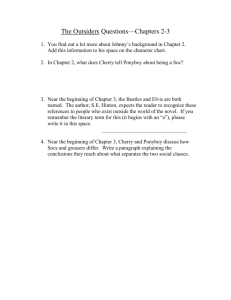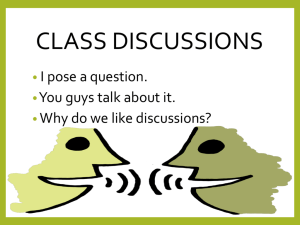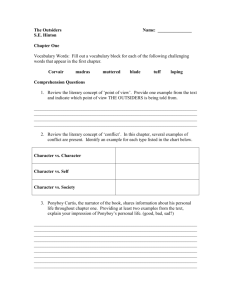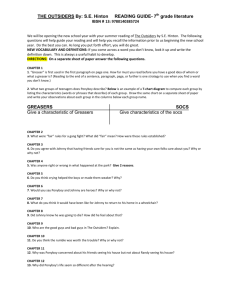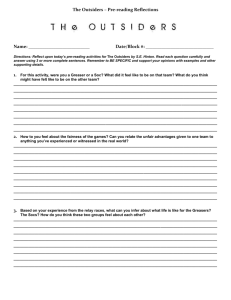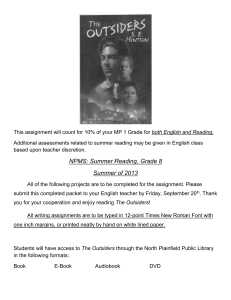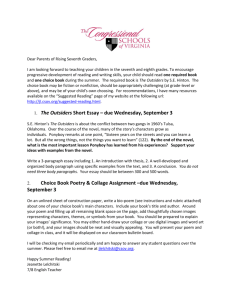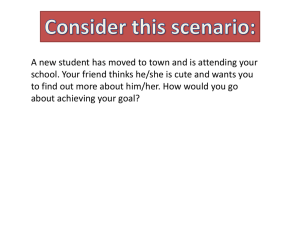Outsiders/Richard Cory PowerPoint
advertisement
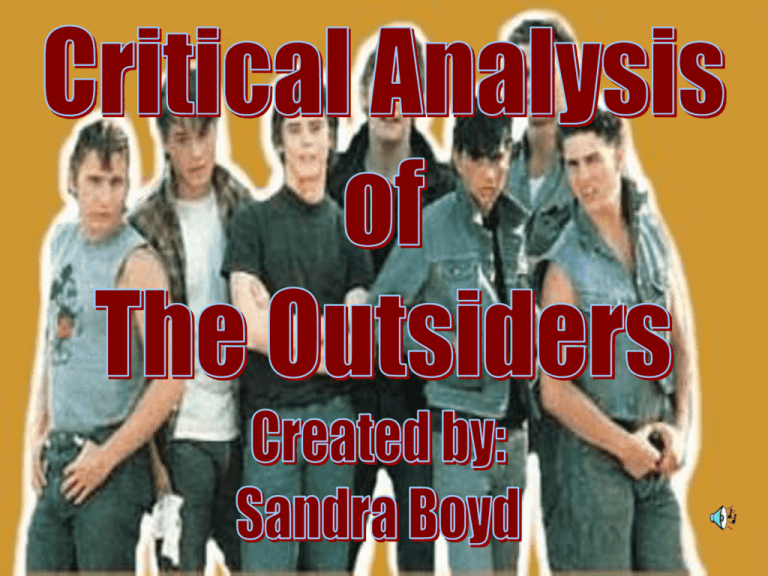
Conflict The central problem in a plot. Man against Man Man against Nature Man against Himself Man against Society The Outsiders is not just a story about gangs and fights. It is a book about the people behind the images. Richard Cory by: Edwin Arlington Robinson Whenever Richard Cory went downtown, We people on the pavement looked at him: He was a gentleman from sole to crown. Clean favoured, and imperially slim. Richard Cory Discussion Questions Stanza One What might it mean that the people “on the pavement looked at him?” Where in the social status is he? Where are they? Describe what Richard Cory looks like. Richard Cory continued And he was always quietly arrayed, And he was always human when he talked; But still he fluttered pulses when he said, "Good-morning," and he glittered when he walked. Richard Cory Discussion Questions Stanza Two How does Richard Cory act toward other people? How do the people see him? Richard Cory continued And he was rich - yes, richer than a king And admirably schooled in every grace: In fine, we thought that he was everything To make us wish that we were in his place. Richard Cory Discussion Questions Stanza Three Do you wish you could be in Richard Cory’s place? Why? Does Richard Cory have it made/does he have any problems? Describe the people who look up to Richard Cory. Richard Cory continued So on we worked, and waited for the light, And went without the meat, and cursed the bread; And Richard Cory, one calm summer night, Went home and put a bullet in his head. Richard Cory Discussion Questions Stanza Four What do you think “So on we work…and cursed the bread” may mean? What do the last two lines reveal? Richard Cory by Edwin Arlington Robinson Whenever Richard Cory went downtown, We people on the pavement looked at him: He was a gentleman from sole to crown. Clean favoured, and imperially slim. And he was always quietly arrayed, And he was always human when he talked; But still he fluttered pulses when he said, "Good-morning," and he glittered when he walked. And he was rich - yes, richer than a king And admirably schooled in every grace: In fine, we thought that he was everything To make us wish that we were in his place. So on we worked, and waited for the light, And went without the meat, and cursed the bread; And Richard Cory, one calm summer night, Went home and put a bullet in his head. The Outsiders is a book that shows that “beneath the trappings of madras or leather, individual hearts have much in common.” "Nothing Gold Can Stay" by Robert Frost Nature's first green is gold, Her hardest hue to hold. Her early leaf's a flower; But only so an hour. Then leaf subsides to leaf. So Eden sank to grief, So dawn goes down to day. Nothing gold can stay. By the time she was 17 years old, Susan Eloise Hinton was a published author. While still in high school in her hometown--Tulsa, Oklahoma--Hinton put in words what she saw and felt growing up and called it The Outsiders, a now classic story of two sets of high school rivals, the Greasers and the Socs (for society kids). Because her hero was a Greaser and outsider, and her tale was one of gritty realism, Hinton launched a revolution in young adult literature. Since her narrator was a boy, Hinton's publishers suggested that she publish under the name of S. E. Hinton; they feared their readers wouldn't respect a "macho" story written by a woman. Hinton says today, "I don't mind having two identities; in fact, I like keeping the writer part separate in some ways. And since my alter ego is clearly a 15-year-old boy, having an authorial self that doesn't suggest a gender is just fine with me." Today, more than twenty-five years after its first publication, The Outsiders ranks as a classic, still widely read and one of the most important and taboo-breaking books in the field. Finally, someone was writing about the real concerns and emotions of a teenager. The Outsiders marked the beginning of a new kind of realism in books written for the young adult market, and Hinton's next four books followed suit. She wrote her second book while she was in college at the University of Tulsa, studying to be a teacher. But "I don't have the nerve or physical stamina to teach," she says. "I did my student teaching, but I couldn't leave the kids and their problems behind me; I'd go home and worry about them. I think people who are good teachers do one of the most important jobs there is; I can't praise them highly enough." David Inhofe, who is now her husband, was her boyfriend then and was instrumental in helping her get her second book written. Hinton was suffering from writer's block. Inhofe refused to go out with her at night unless she wrote two pages during the day, and slowly but steadily over four months, she compiled the manuscript that became That Was Then, This is Now, a story of drugs, delinquency, and a tough kid making a tough decision. She and David were married in 1970; the second book was published in 1971. I. 1. 2. 3. 4. 5. 6. 7. 8. Plot Development in The Outsiders Refer to page 603 in Introducing Literature textbook. According to this page,what is the plot of a novel? What three things does the plot do? Look up conflict. Define it. List two major types of conflict and their definitions. What is the major conflict in The Outsiders? List several minor conflicts in The Outsiders. What scene is the climax of the plot? Describe it briefly. How is the major conflict resolved? II. Character Development in The Outsiders 1. Read Characterization on pages 109 and 598-599 in Introducing Literature text. List three methods an author uses to reveal a character’s personality. **Which ones does S.E. Hinton use? 2. Make a list of major and minor characters. Think carefully about which list to put each character in. 3. List the conflicts experienced by Ponyboy, and label them as internal or external. II. Character Development in The Outsiders Continued 4. What characterization methods are used to portray Ponyboy? 5. What is Ponyboy’s character like initially? 6. What forces cause Ponyboy to change? II. Character Development in The Outsiders Continued 7. What is Ponyboy like after he changes? 8. What is the turning point in Ponyboy’s character development? 9. Write a sentence describing each of the following characters: Ponyboy Dally Johnny Soda Two-bit Darry Cherry II. Character Development in The Outsiders Continued 10. Why is Johnny such a nervous boy? 11. How do the others feel toward Johnny? 12. What is Ponyboy’s family situation? Name 5 differences between the Socs and the Greasers. III. Setting in The Outsiders 1. Read Setting on page 131 and 605 of Introducing Literature. Define it. 2. What is the setting of The Outsiders? 3. How does the author establish the setting? 4. Could this story take place in another setting? Why, or why not? IV. Theme in The Outsiders 1. Read Theme on pages 145 and 605 of Introducing Literature. Define it. 2. Themes are important in what types of literature? 3. Does The Outsiders fit this category? 4. Write some themes expressed in The Outsiders that can be applied to our everyday life. (Star the most important) V. 1. The Outsiders Study Questions: Ponyboy comments that self-defense is the only good reason for fighting. Do you agree? Why, or why not? 2. Sodapop insists that if he, Darry, and Ponyboy don’t have each other, they have nothing. Do you agree? Why, or why not? 3. Some critics say that The Outsiders is too sentimental. Do you agree? Why,or why not? 4. Discuss the violence in The Outsiders. How do you define violence? Do you object to it? Why do you think the author included it? 5. Explain why you do, or do not agree with Johnny’s message to Ponyboy. VI. Literary Terms that apply to The Outsiders A. Look up each term below. Read about it, then: 1. define it 2. give an example of it from the book if it applies. a. allusion h. symbol b. atmosphere i. tragedy c. dialect d. dialogue e. flashback f. irony g. point of view (3 types) Outsiders. * the one used in The VII. Vocabulary Development in The Outsiders 1. Below is a list of vocabulary words found in The Outsiders. For each word— a. find the page and skim until you locate the word b. write the sentence that the word is used in. c. from the way the word is used in the sentence, make up a definition of it d. look up the word in the dictionary. Write the definition that is appropriate for the way the word is used in the novel. unfathomable sagely roguishly incredulous quavered ruefully conviction premonition aghast stupor vaguely indignant contemptuously subsides eluded
